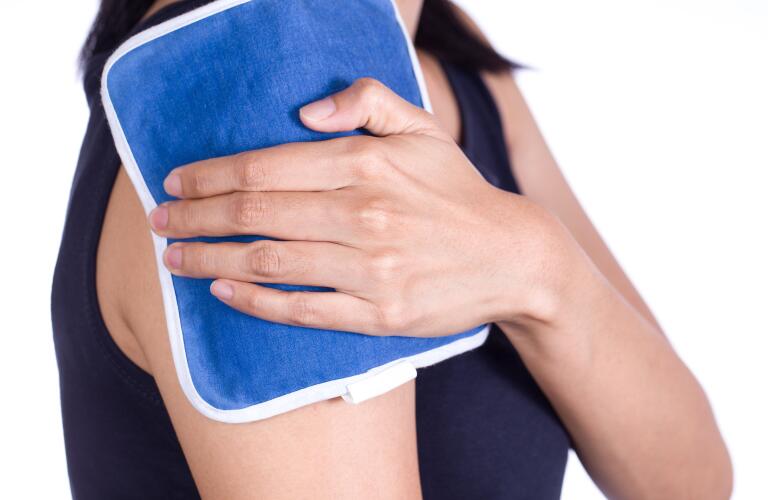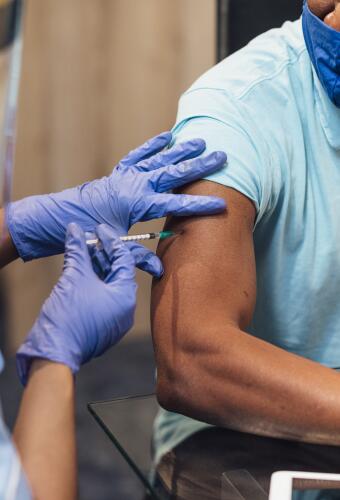
Most people who receive any of the COVID-19 vaccines experience side effects. That’s actually a good thing, because it means your immune system is responding strongly to the vaccine—and should respond equally as well if the SARS-CoV-2 virus enters your body.
Some people experience only mild COVID vaccine side effects, while others have stronger symptoms. A few people have experienced an allergic reaction to the Moderna and Pfizer-BioNTech mRNA COVID vaccines, including anaphylaxis. This type of life-threatening COVID vaccine reaction is very rare, however, and should not deter you from getting vaccinated if you’re otherwise healthy.
Officials paused Johnson & Johnson (J&J) COVID-19 vaccination while the Food and Drug Administration (FDA) and the Centers for Disease Control and Prevention (CDC) investigate a possible link to a rare and serious type of blood clot.
Find out what to do for your COVID-19 vaccine side effects and adverse events, including when to call for emergency medical assistance.
Serious Adverse Events After COVID-19 Vaccination
In medicine, an adverse event is an unexpected and undesired effect of a medication. Some are known as a potential event or complication, and some have not yet been observed. Side effects are also unwanted, but they are typically expected and oftentimes go away with continued use of the medication (or by lowering the dose). Adverse events and side effects can be mild to severe. COVID-19 vaccines have known side effects, but they also carry a risk of some serious adverse events.
Signs and Symptoms of a COVID Vaccine Allergic Reaction
If you have ever had an allergic reaction to any type of vaccine, you should consult your healthcare provider about whether or not to receive the COVID-19 vaccination. Studies have shown the COVID vaccines are safe for most people and only rarely induce a severe allergic reaction. Nonetheless, most immunization sites require people receiving the vaccine to be monitored for 15 to 20 minutes after receiving the injection in case they have a serious adverse reaction.
Severe allergic reactions usually appear within the first four hours—most within 15 minutes—of receiving a COVID-19 vaccination. Call 911 for emergency medical responders if you experience any of these signs or symptoms within that time frame:
- Itching, redness, or hives spreading across the body
- Loss of consciousness
- Swelling of the lips, tongue or face
These can be signs of anaphylaxis, which is a life-threatening emergency. Get immediate assistance.
Fortunately, the vast majority of people do not experience these types of severe symptoms from the COVID vaccines. You can treat mild to moderate post-vaccination symptoms at home.
Signs and Symptoms of a Blood Clot
The J&J vaccine, but not the Moderna or Pfizer mRNA vaccines, is linked to a extremely rare but serious type of blood clot known as a central venous sinus thrombosis, in combination with a low blood platelet count (thrombocytopenia). FDA and CDC officials temporarily paused the J&J vaccine, but lifted the pause after a thorough review of cases, concluding the benefit of the J&J vaccine outweighed the very low risk of blood clots. Most people who developed the condition were females ages 18 to 49. Anyone who develops a severe headache, abdominal pain, leg pain, or shortness of breath within 1 to 2 weeks of receiving the J&J COVID-19 vaccine should contact a healthcare provider promptly.
Signs and Symptoms of Myocarditis or Pericarditis
There are increasing reports of myocarditis—inflammation of the heart, and pericarditis—inflammation of the membrane surrounding the heart, following vaccination with either of the two mRNA vaccines. So far, these adverse events are predominantly occurring in adolescent males, most commonly within two days after receiving the second dose of vaccine.
The events are rare, with an incidence of 16 cases per million second doses administered to people ages 30 years and younger, based on data presented at vaccine safety meeting in early June 2021. Most patients who received medical care for myocarditis or pericarditis recovered with medication and rest. The known and potential benefits of COVID-19 vaccination outweigh the known and potential risks, according to the CDC. Vaccine safety agencies continue to investigate known and newly developing cases of myocarditis/pericarditis. The American Heart Association/American Stroke Association advises all adults and children 12 and older to get vaccinated with any of the COVID-19 vaccines.
Call your or child's doctor for symptoms of myocarditis/pericarditis, which most commonly include chest pain, difficulty breathing, and abnormal heartbeat.
Signs and Symptoms of Guillain-Barre Syndrome
The CDC and FDA are investigating rare reports of Guillain-Barre syndrome (GBS) in people who received the J&J vaccine. GBS is a neurologic condition that can cause muscle weakness and paralysis. Vaccines are a known risk factor for GBS, but it is still rare. Overall, most people make a full recovery from GBS, but there is a chance of long-term loss of function and paralysis.
Common COVID-19 Vaccine Side Effects—and What to Do for Them
Because the COVID-19 vaccine is designed to stimulate your immune system, you might experience flu-like symptoms in the days following the injection. They may be more pronounced after receiving the second injection. A recently authorized COVID-19 vaccine from Johnson & Johnson requires a single injection; side effects are similar to the Pfizer-BioNTech and Moderna vaccine side effects. These symptoms do not mean you’re getting sick with COVID-19. None of the vaccines authorized for use or still in clinical trials in the U.S. can give you COVID-19 because they do not contain any SARS-CoV-2 virus.
Some recent research indicates that taking nonsteroidal anti-inflammatory medicines (NSAIDs) may reduce a vaccine’s effectiveness. Because of this possibility, it might be wise to avoid NSAIDs and take acetaminophen (Tylenol) for pain or fever if necessary.
Fortunately, you can do plenty of other things to help yourself feel more comfortable in the face of post-vaccination side effects. Try these self-care approaches at home.
Chills
Getting the chills after being vaccinated for COVID-19 appears to be somewhat common and may not necessarily be accompanied by fever. The chills should not last more than a day or two, so keep a sweater at hand to put on when cold, and remove it if you start to feel too warm. A warm bath or shower also might help keep the chills from being too uncomfortable.
Fatigue
Many people report that the COVID vaccine caused fatigue. The best thing you can do for this tiredness is rest. By sleeping or napping, you conserve energy and allow your immune system to use that energy to create a strong immune response to keep you safe later, if you’re exposed to SARS-CoV-2.
Fever
Some people say they got a fever from the COVID vaccine, which makes sense because some of the body processes required to create an immune response can raise your body temperature. You should drink plenty of water if you feel feverish, as this will help you stay hydrated. If your fever is mild to moderate (below 100.3°F), you do not need to treat it. If you experience an elevated temperature, call your healthcare provider’s office for guidance on whether to treat it or not.
General Malaise or Flu-Like Symptoms
You might feel generally sick after getting immunized for COVID-19. Take heart in knowing these symptoms will go away within a few days. While you wait them out, you can indulge in self-care, such as napping, hot or cool baths, aromatherapy, watching television—or anything else that helps get your mind off these unpleasant COVID vaccine symptoms.
If you have nausea or dizziness, keep your activity level down and eat and drink small amounts. Good choices include watered-down fruit juice, broth, Jell-O, bananas, crackers, toast, applesauce, low-fat dairy, and baked or broiled chicken, turkey or pork. Avoid sugary items, caffeine, alcohol, and fried or greasy food.
Headache
You may get a headache after receiving a COVID-19 vaccination. In fact, it’s one of the most common complaints people have after receiving either the Pfizer-BioNTech or Moderna vaccine. Mild or moderate headaches may not require treatment and should go away within a few hours. If the pain is unbearable, you may take acetaminophen to relieve the ache. Drink plenty of fluids (not alcohol) and try to sleep, or at least lie down and rest. A temple massage may also help.
Pain at the Injection Site
Like many immunizations into the upper arm muscle, the COVID-19 vaccine can cause pain, swelling, and warmth at the injection site. This is normal. You may be able to minimize this effect by moving your arm frequently after receiving the injection, preventing stiffness. If the pain is significant, apply cold packs over a towel to the affected area for 20 minutes at a time. After the swelling goes down—about 24 hours later—switch to warm (not hot) compresses 20 minutes on, 10 minutes off. Heat will help relax the muscle.
Swollen Lymph Nodes in Armpit
The Moderna and Pfizer-BioNTech COVID-19 vaccines may cause tenderness and swelling of underarm lymph nodes of the injected arm. Vaccines that cause a strong immune response can result in this type of local reaction, known as axillary adenopathy. Underarm swelling due to vaccination may go away in a few days, but it could take a month or longer for swollen lymph node(s) to completely resolve. Cold compresses will help decrease swelling and pain; acetaminophen may ease pain as well.
An underarm lump is a clinical sign for many different health concerns, including various infections, lymphoma, and even breast cancer which has spread to the nearby nodes. Feeling a lump under your arm may be alarming, but if you see or feel a lump under your arm within about four weeks following your vaccination (first or second dose), it is more likely to be due to the vaccine than other possible causes. Contact your doctor if the problem persists or you have other concerns.
Axillary adenopathy will show up on a breast ultrasound or MRI; so, if you need either of these imaging tests and you were recently vaccinated, contact the imaging facility for guidance. If you are due for a breast cancer screening ultrasound, it’s best to schedule it before your vaccination or delay it 6 to 8 weeks if you were recently vaccinated. This may help avoid unnecessary follow-up studies, such as a lymph node biopsy.
The Bottom Line
Serious adverse events following COVID-19 vaccination are rare. Receiving a COVID-19 vaccination may produce some unpleasant side effects for a couple of days, but these symptoms indicate the vaccine is causing the desired immune response. With a little self-care at home, you can weather any side effects and get back to your normal, active life within a few days.








